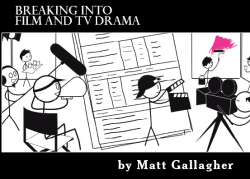Page 1 blog: The importance of being a runner
E xcerpt from the book BREAKING INTO UK FILM & TV DRAMA by Matt Gallagher now available on Amazon.
xcerpt from the book BREAKING INTO UK FILM & TV DRAMA by Matt Gallagher now available on Amazon.
As mentioned, when you leave school, college, university or film school, no matter what your grades are, it’s likely that you will be starting out as a runner. Lots of people hate the thought of being a runner, and try to either bypass the stage or get promotion as quickly as possible, but if you can embrace it, you will find that being a runner is a positive and vital part of your professional education.
Don’t Rush
Whatever you learned about film and TV before you got into the industry, you will find that the practical experience of being on set is very different. You need time to find your feet and learn the ropes: running is the perfect job for that. Give yourself at least six months to absorb life in the professional environment, learn the un-written rules, the hierarchies and structures across film, TV, commercials and promos. The learning curve is steep and you don’t want to have any big knowledge gaps that could be exposed later on, so make sure to soak it all up.
If you aspire to be a director, and simply can’t wait to get involved, then I would recommend you make short films and absorb all of the information on film making that you possibly can. For aspiring directors, I also recommend working with local theatre groups while earning a living as a runner. Managing and manipulating a performance from an actor takes skill, and it’s one you can learn by spending time on by rehearsing plays. Directors like Sam Mendes, Danny Boyle and Stephen Daldry all come from a theatre background, and their intimate relationship with their actors is evident in every scene. (There is a paid, training bursary available for young theatre directors through the Regional Theatre Young Director Scheme, find the link in the back of the book.)
Find A Job You Love
The industry needs all kinds of specialist skills, and there are hundreds of roles, each suited to a wide range of personality types ̶ you may find you are brilliant at something you had never previously considered. Take your time and be curious about everything that’s out there. It’s important to find something you love, because you will be spending every waking hour doing it.
Develop A Sense of Perspective
There are many people ̶ your competition – who resolutely do not want to be a runner. Every production manager has met their fair share of recent university graduates asserting ‘actually, I’m a director of photography’… they will usually be told to stick the kettle on.
If you are employed as a runner, concentrate on being reliable, friendly, trustworthy and unflappable before you start shoving your show-reel or script into the hands of everyone you meet. Prove you are indispensable, and you will be the first one getting the call for work on the next production. That gives you a really solid grounding on which to build.
The step up from runner, be it to production assistant, production secretary, third AD or an assistant will always be a bigger leap that you imagined. These roles carry extra responsibility, and the skills you will have learned as a runner or trainee will help you make the transition.
This clip from Charlie Brooker's Screenwipe sums up what it's like to be a runner starting out. This is required viewing....
Building A Network
As a runner, you are likely to be placed on lots of jobs for short periods and will get the chance to mix with other entry-level colleagues. Don’t see other runners as rivals but as allies. Keep in touch with the good people you encounter, help each other find work and share advice, and that growing network will become incredibly useful as you all start moving up through the ranks. If they get a call about a job they are unavailable to do, they may recommend you for the role instead, and vice versa. You may even start employing one another on future projects.
Genre Jumping
There are not many senior positions where you can jump between genres. People often end up working on a cycle of one particular type of production and stay there. It’s much harder to jump from say, factual TV to features without taking a step (or three) down the ladder.
Runners are in the unique and fortunate position of being needed on all genres, regardless of previous experience, and are likely to be working on a TV series one day and a commercial the next. You can flit between the genres and gain experience from each before settling into the one that feels like home.
More great articles: How to write a great cover email.